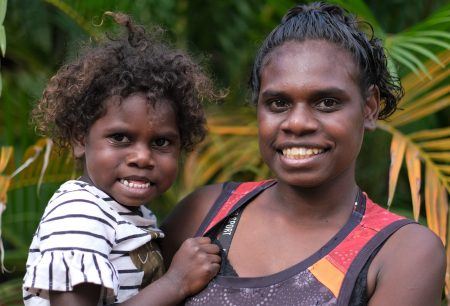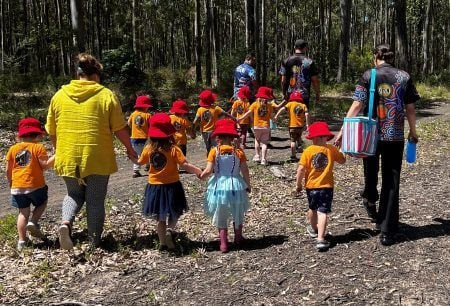Focus Areas

Early Childhood Development
A core component of work that SNAICC undertakes is the advocation for, support for and development of effective Early Childhood Development programs that are created, managed and delivered by Aboriginal and Torres Strait Islander people.
Early Childhood Development
Child & Family Wellbeing
Another core component of work that SNAICC undertakes is the development, implementation, monitoring and evaluation of evidence-based approaches to strengthen the safety and wellbeing of Aboriginal and Torres Strait Islander children.
Child & Family Wellbeing
Closing the Gap
Closing the Gap is an agreement between the Coalition of Aboriginal and Torres Strait Islander Peak Organisations and all Australian governments on how government works with Aboriginal and Torres Strait Islander people.
Closing the GapOur role
We work to provide a strong National Voice for Aboriginal and Torres Strait Islander children to support their safety, development and wellbeing.
At a national level, we represent and advocate for Aboriginal and Torres Strait Islander children and families through three interconnected roles Research, Policy & Leadership, Sector Development and Community & Sector Voice. Through these interconnected roles, we advocate for and support the development of critical services to improve access to holistic and culturally safe services for Aboriginal and Torres Strait Islander children and families. By doing so, we harness the potential of communities to effect genuine, long-term change for Aboriginal and Torres Strait Islander children and families across Australia.
Research, Policy & Leadership
Community & Sector Voice
Sector Development
What we do
As the national peak body Aboriginal and Torres Strait Islander community-controlled organisation that works to improve outcomes and opportunities for Aboriginal and Torres Strait Islander children and strengthen the capacities of families across Australia, we design policies that promote sustained positive systemic and institutional change, advise governments on strategies and actions and play a pivotal role in shaping legislation, policies and practices that inherently support the safety, development and wellbeing of Aboriginal and Torres Strait Islander children.
Our work covers a broad spectrum of sectors, including Early Childhood Development, Child & Family Wellbeing and Child & Maternal Health. Within these areas, we represent Aboriginal and Torres Strait Islander children, families, communities and organisations to all levels of the Australian Government.
SNAICC’s key principles:
- self-determination for Aboriginal and Torres Strait Islander peoples
- value and respect for Aboriginal and Torres Strait Islander cultures
- collaboration with relationships of trust and confidence
- innovation and flexibility
- culturally informed, evidence-based best practice
- commitment to child rights principles and a child-centred approach.
We actively collaborate with Aboriginal and Torres Strait Islander community-controlled organisations, non-Indigenous service providers and all levels of governments to enhance the design and delivery of supports and services for Aboriginal and Torres Strait Islander children and families. Through these engagements, we work to effectuate genuine, long-term change that improve outcomes and opportunities for Aboriginal and Torres Strait Islander children and strengthen the capacities of families across Australia.
SNAICC’s target outcomes:
- culturally strong families and communities: family—as the foundation of Aboriginal and Torres Strait Islander children’s social, cultural and emotional wellbeing—have access to integrated supports and resources they need
- awareness and understanding among the broader population: SNAICC increases awareness and shifts attitudes through amplifying our stories and providing avenues for support to influence the laws and policies that support our children
- strong and effective national peak body for children: SNAICC is strong, stable and respected as an effective peak in providing a platform for Aboriginal and Torres Strait Islander voices—both individual and collective—on issues impacting children
- culturally strong and responsive to laws, policies and practices: SNAICC influences policy reform and practice to achieve outcomes that will benefit our children and families through promoting an enabling environment of laws, policies, procedures and practices that values their cultures, hears their voice and respects their ways
- strong members and other services: SNAICC’s members have adequate funding and resources to grow and ensure our children and their families access the supports that they need to grow up strong, healthy and proud of who they are, with the skills to realise their potential.
Key programs
Our programs and campaigns provide a strong National Voice for Aboriginal and Torres Strait Islander children, that work to support their safety, development and wellbeing.
Resources
Join Us
Be part of our advocacy efforts and stay informed about our initiatives.
Become a member today and add your voice to the cause.








